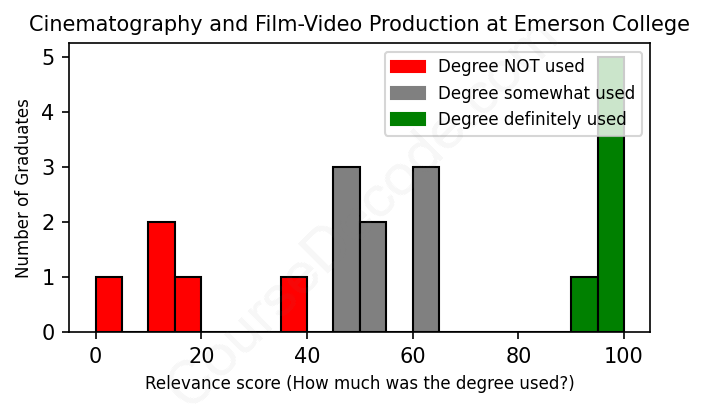
First, some facts. Of the Cinematography and Film-Video Production graduates from Emerson College we've analyzed , here's how many have used (or NOT used) their degree in their career:

These are estimates based on AI analysis of 19 LinkedIn profiles (see below).
The verdict? Below average. Overall, with an average relevance score of 57%, Cinematography and Film-Video Production graduates from Emerson College have a lower likelihood (-10%) of finding work in this field compared to the average graduate across all fields:
And for comparison, here's the chart for all profiles we've looked at across all degrees.
Also, after graduating, only 10% of these graduates have pursued further education other than another Bachelor's degree (such as a Masters degree or other), compared to the average across all profiles of 35%. This suggests a Bachelors degree is enough for most Cinematography and Film-Video Production graduates, and it's normal to look for work straight after graduation.
See the details:
|
Relevance score: 52% We think this person has gone into a career only somewhat relevant to their degree. We think this person has gone into a career only somewhat relevant to their degree.
DEGREE INFOGraduated in 2016 from Emerson College with a Bachelor of Arts (B.A.) in Cinematography and Film-Video Production. No other secondary education since. JOB HISTORY SINCE GRADUATIONIntern Revolver Gallery Sep 2016 - Dec 2016 Makeup Artist  Este Lauder Aug 2017 - Aug 2018 Complex Rehab Support Admin  A&A Medical Supply LLC Aug 2018 - Nov 2020 Rehab Support Supervisor  Reliable Medical Supply Apr 2020 - Jan 2022 Marketing Specialist  HV Supply Jan 2022 - Nov 2023 Multimedia Illustrator/ Storyboard Artist  Freelance Sep 2018 - Present Digital Marketing Coordinator  Bright Industry LLC Dec 2021 - Present ABOUTNo information provided. |
The top 10 most common jobs done by the graduates we've analyzed (ranked most common to least) are:
Here is a visual representation of the most common words in job titles for Cinematography and Film-Video Production graduates (this is across all Cinematography and Film-Video Production graduates we've analyzed, not just those who went to Emerson College):

Looking at the career paths of Emerson College graduates in Cinematography and Film-Video Production, it's clear that many kick off their journeys with entry-level positions related to production, like PAs (Production Assistants), interns, or editors. For instance, graduates from the early 2010s often started off as PAs at production companies or in various support roles. Over the first few years after graduation, some of them began to land editing gigs or directing opportunities, showcasing a transition towards more specialized roles in the film and video industry. By about five years out, many of these graduates appear to establish themselves as freelancers or move up to specific roles like cinematographers or technical directors. A few have even founded their own production companies, indicating a strong entrepreneurial spirit in the film community.
However, not all of their paths have remained strictly within the cinematic universe. A number of graduates seem to drift into unrelated fields, such as administrative roles or even marketing. By the five to ten-year mark, you'll see a mix of success stories in the industry alongside those who’ve pivoted into different careers altogether. This highlights the competitiveness and sometimes harsh realities of the film industry, where not everyone remains in filmmaking or production despite their aspirations. Overall, while many graduates take on meaningful and relevant jobs, there’s a significant portion who find themselves in jobs that are reasonably provided but not directly aligned with their degree. So, it seems like a bit of a mixed bag!
Getting a Bachelor’s degree in Cinematography and Film-Video Production at Emerson College can be pretty intense, but it really depends on how passionate you are about film and storytelling. The program is hands-on and involves a lot of creative and technical work, which can be a blast if you’re into it, but it does demand long hours and a fair bit of dedication. You’ll be juggling classes, projects, and possibly even internships, which can be a lot to manage at times. So, while it might be easier for those who thrive in creative environments, it can feel challenging if you’re not super motivated or organized. Overall, it’s definitely more rigorous than some other degrees because of how immersive and skill-based it is—so if you’re ready to dive deep into the world of film, you’ll probably find it exhilarating!
Most commonly, in the LinkedIn profiles we've looked at, it takes people 4 years to finish a Bachelor degree in Cinematography and Film-Video Production.
Looking at these Emerson College grads and their job paths after getting their degrees in Cinematography and Film-Video Production, it seems like they've had a mix of financial success. Some of the early roles, like production assistants and interns, usually don't pay a lot, which is something to expect when starting out in this industry. However, as they progressed, many landed positions like editors, directors, and various creative roles that generally offer better salaries. The timeline shows that it can take a few years of hustling and gaining experience before hitting those higher-paying jobs, but those who stuck it out in the film industry likely saw a decent income while others have diversified into marketing or freelancing, which can also be lucrative if they build a solid client base. Overall, it's clear that while the journey involves a lot of entry-level gigs, there’s potential for making decent money down the road if they play their cards right!
Here is a visual representation of the most common words seen in the "about" section of LinkedIn profiles who have a Bachelor degree in Cinematography and Film-Video Production (this is across all Cinematography and Film-Video Production graduates we've analyzed, not just those who went to Emerson College). This may or may not be useful:

Here are all colleges offering a Bachelor degree in Cinematography and Film-Video Production (ordered by the average relevance score of their Cinematography and Film-Video Production graduates, best to worst) where we have analyzed at least 10 of their graduates:
| College | Score | Count |
|---|---|---|
 Savannah College of Art and Design Savannah College of Art and Design
|
67 | 14 |
 Full Sail University Full Sail University
|
59 | 38 |
 Emerson College Emerson College
|
57 | 19 |
 San Francisco State University San Francisco State University
|
49 | 18 |